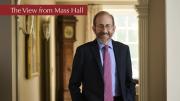When should a government be permitted to violate its own laws? How should such occurrences be handled after the fact? In this issue's Forum, Charles Fried, Beneficial professor of law at Harvard, and his son Gregory Fried ’83, professor of philosophy at Suffolk University, examine legal and philosophical arguments, with examples from American history. The authors focus their attention on the response to the 9/11 terrorist attacks—and ultimately disagree about whether they favor prosecution of government officials.
Read the article, then answer our question to readers this issue:
Do you think the U.S. government's actions in the wake of 9/11 were justified? Do you favor prosecution for some elements of the response to the terror attacks?
We hope you'll join the conversation by leaving a comment below. (Please note: because this discussion is moderated, your comment will not appear immediately.)








